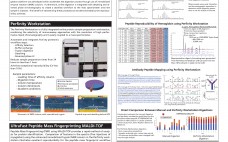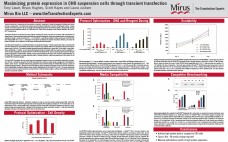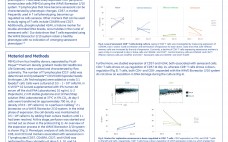Cookie Cutter Proteolysis: Achieving Reproducible, Efficient Digestions for Proteomic Workflows  Protein sample preparation workflows for mass spectrometric analysis that involve proteolysis are often labor-intensive, time consuming and user dependent. These workflows often involve digestion, solid phase extraction, drying, and re-suspension prior to reversed phase separation into the mass spectrometer. The introduction of variability at many of these steps hinders discovery initiatives as well as the ability to convert these discoveries into viable assays.  Recently, an automated protein digestion…
2014 Collection
Maximizing Protein Expression in CHO Suspension Cells Through Transient Transfection
Transient transfection in mammalian cell lines provides an avenue for researchers to bridge the development bottleneck and shorten the time to usable protein. The method also maintains post translational modifications crucial for biotherapeutic function. Chinese Hamster Ovary (CHO) suspension cells are especially suited for high yield production of recombinant proteins, despite being refractory to commonly used transfection methods (e.g. 25kDa linear PEI). Mirus Bio has developed a more effective alternative, the TransIT-PRO® Transfection Kit. Transfection efficiencies are affected by many…
T Cells Expanded in the WAVE Bioreactor™ 2/10 System Maintain a Healthy Phenotype
T cell immunotherapy often requires the expansion of a small select starting population in vitro. To achieve therapeutic doses, this population is required to undergo multiple and rapid rounds of replication. Rapid T cell expansion raises the possibility of inducing senescence or an aged phenotype, both of which are detrimental to the recipient patient. The WAVE BioreactorTM System is often used for the final expansion phase before patient infusion and we have analysed the aging characteristics of T cells that…
Transfer of Hepatic Progenitor Stem Cell Culture Process from Multitray Stacks to the Integrity® Xpansion™ Multiplate Bioreactor
Scale-up a stem cell process may be challenging: small variations in physicochemical parameters (surface characteristics, pH and dissolved oxygen) can heavily impact stem cell growth and behavior. The Integrity® Xpansionâ„¢ multiplate bioreactors have been designed to enable an easy transfer from multiple-tray stacks process by offering the same cell growth environment: stacked hydrophylized polystyrene plates in a compact and closed system (from 10 to 200 plates per bioreactor equivalent respectively to 6120cm² and 122400cm²). As there is no headspace between…




